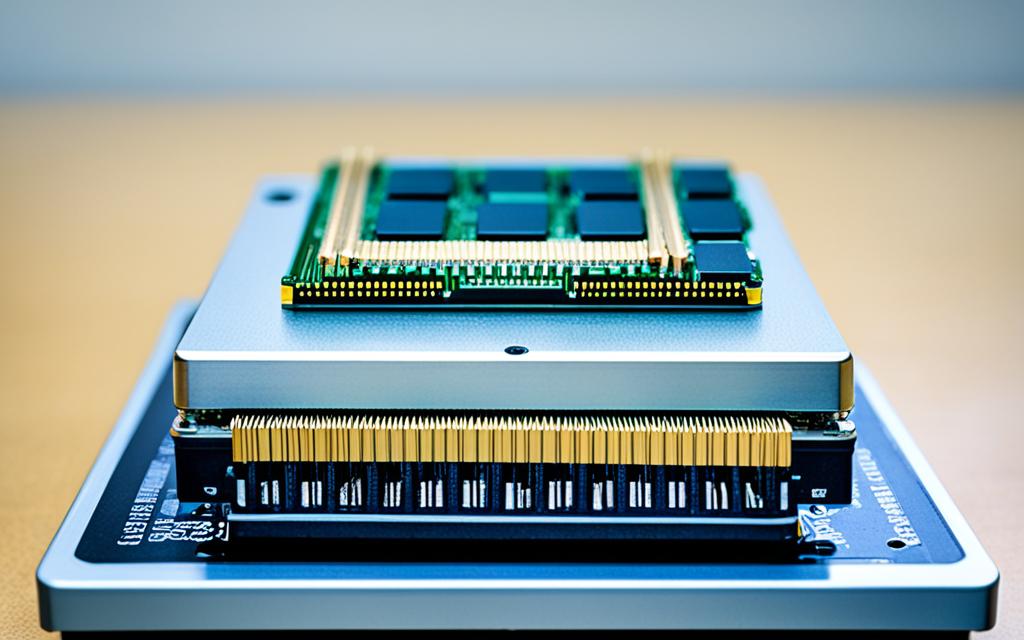Table of Contents
In today’s fast-moving tech world, figuring out if you can use RAM that’s faster than your CPU’s limit is important. People want the best performance, so it’s key to know about RAM and CPU fits. The top-speed RAM you can get now is DDR4-3200. It’s speed matters because it helps with how fast data moves1. For regular use, 8GB of RAM is often enough. But, gamers usually need at least 16GB for a smooth experience1.
Putting in RAM that’s too quick for your CPU can be tricky. It might not work as well as hoped, leading to some issues1. This is why we’re looking closely at how RAM speed changes your computer’s overall working. And how CPUs and memory specs need to match properly.
Key Takeaways
- Using high-speed RAM can boost performance, but only in programs that need lots of memory.
- For the best system work, your RAM and CPU must get along well.
- Fast RAM doesn’t always mean your computer will run better.
- Knowing what your motherboard can handle is key for picking the right RAM.
- XMP can help you get the most out of your RAM.
- Pushing RAM beyond what the CPU can handle might lead to unstable systems.
Understanding RAM Speed and Its Importance
In our digital age, knowing about RAM speed is key for better system performance. It’s about how quickly your system handles data. Measured in megahertz (MHz), the frequency of RAM tells us how fast it can read and write data. For example, older DDR2 modules work at 800MHz, while the latest DDR5 ones reach up to 6800MHz2. This shows how RAM performance can differ greatly, affecting demanding applications.
What Is RAM Speed?
RAM speed is about the pace at which the CPU accesses information. A higher RAM frequency means the memory can transfer data faster. This is crucial for faster communication between your computer’s parts. It’s not just gamers who benefit; even programmers see improved code compiling with higher RAM speeds3. For heavy tasks like video editing and 3D rendering, upgrading your RAM can make everything smoother and quicker3.
How RAM Speed Affects Performance
There’s a strong link between RAM speed and how well a system works. Fast RAM speeds up data transfers, boosting overall RAM efficiency. This is a big plus for memory-heavy apps. For instance, switching to dual-channel memory can make games run 20% better4. However, be cautious with overly fast RAM as it may crash your system2.
Types of Applications Benefiting from Faster RAM
Certain apps see major gains from quick RAM. Video editing, 3D rendering, and games all rely on fast RAM for smoother running. Moving from DDR4-2400 to DDR4-3600 RAM gives a noticeable performance uplift. You’ll see better speeds and stability when running these apps4. Investing in faster RAM is a smart move for any system upgrade.
The Role of the CPU in RAM Compatibility
The CPU and RAM need to work well together for a computer to run smoothly. The CPU plays a big role in whether or not RAM will work well in your system. This is because the CPU’s features and what it can do affect how well RAM upgrades will pay off.
How CPUs Determine Maximum RAM Speed
CPUs set the top speed that RAM can go in a system. This is often listed in the CPU’s details. For example, some Intel chips support RAM speeds up to DDR3-1600. This shows how the CPU’s speed can impact the RAM’s performance.
If RAM and CPU speeds don’t match, it can slow down your computer. It’s important to ensure their speeds are compatible. This helps your computer handle tasks more efficiently and avoids slowdowns from mismatched speeds56.
Importance of Motherboard Specifications
Motherboards also matter a lot for RAM compatibility. They dictate what RAM types and speeds can be used. High-end motherboards, like Intel’s Z-series, support faster RAM, making the most of the CPU and RAM’s abilities7.
However, cheaper motherboards might limit RAM speed and affect performance5.
Can I Use Higher Frequency RAM Than CPU?
Using faster RAM may lead to significant performance boosts in demanding apps. But, if the RAM speed is higher than what the CPU can handle, it will work at the CPU’s highest supported speed. This shows the importance of matching system parts carefully when upgrading your RAM.
Real-World Implications of Using Faster RAM
Faster RAM can greatly improve gaming and video editing. It can make apps more responsive and reduce load times. However, if the RAM is too fast for the CPU, you might see instability or the RAM slowing down, which lessens the benefits.
Examples of RAM Compatibility with Different CPUs
Take a look at different CPUs. A Z590 motherboard supports RAM speeds from 3200MHz to 5000MHz. On the other hand, a B560 motherboard supports 2933MHz to 3200MHz. This shows the big role of the CPU’s memory controller and motherboard in achieving the best RAM performance.
Looking at Intel’s platforms helps us see something important. The top RAM speed now is DDR4-3200, running at 3200MHz. While 8GB of RAM is enough for most, gamers often choose at least 16GB to improve their gaming. It’s key to make sure your RAM matches your CPU for the best experience.
For more details on how RAM speed impacts system performance, check out this resource81.
Overclocking RAM: Is It Worth It?
Overclocking RAM means boosting memory speed beyond the maker’s suggested limits. This aims to improve system functionality. If successful, it lets users get more from their hardware. But, it requires a compatible motherboard and deep knowledge of both rewards and risks.
The Basics of Overclocking RAM
One key advantage of overclocking is faster memory speeds. This is a big plus for gaming and demanding tasks. Overclocking DDR5 RAM, for example, can enhance gaming experiences with smoother play and less lag. Companies like Kingston FURY help users push RAM performance to its limits9.
Risks and Rewards of Overclocking
Yet, overclocking RAM has risks. It might make systems unstable, risking warranties and component damage. Plus, performance boosts may not significantly impact every task10. Thus, those interested should carefully consider their tech skills. For tips on RAM optimization, see how to monitor and upgrade RAM8.
FAQ
Can I use higher frequency RAM than what my CPU officially supports?
Yes, you can use RAM that’s faster than your CPU’s max speed. But it will work only up to the CPU’s limit. Even if you can’t use the RAM’s full speed, it can still make some tasks quicker.
What is the typical impact of RAM speed on gaming performance?
Higher RAM speed often means better game performance. This is true for games that need a lot of memory. Faster RAM decreases delays and makes games smoother, enhancing your play.
What types of applications benefit from faster RAM speeds?
Video editors, 3D models, and new games work better with fast RAM. They need lots of memory speed to run well. So, quicker RAM can boost their performance.
How do I know if my CPU supports faster RAM speeds?
Check your CPU’s details or the maker’s site for max RAM speed info. This will help you pick the right RAM for your CPU.
Is it necessary to have a high-end motherboard to utilise faster RAM speeds?
Yes, better motherboards usually support faster RAM. Intel’s Z-series is good for this. But cheaper boards might not work with faster memory.
What happens if I install RAM that exceeds my CPU’s maximum supported speed?
RAM faster than your CPU’s limit will just match the CPU’s top speed. You won’t get to use all the RAM’s speed, but it can still be quicker than slower memory.
What risks are associated with overclocking RAM?
Overclocking RAM can boost speed but may cause problems like instability or damage. Be sure you know the risks and prepare your system properly.
Can I achieve noticeable performance improvements by overclocking my RAM?
Overclocking RAM can improve data handling for some tasks. But the benefits vary, and it might not always be worth the risk.
Source Links
- https://techyimpacts.com/can-i-use-higher-frequency-ram-than-cpu/ – Can I Use Higher Frequency Ram Than CPU: Pro Guide In 2024
- https://www.velocitymicro.com/blog/important-ram-speed/ – How important is RAM speed? | Velocity Micro
- https://www.lenovo.com/us/en/glossary/does-ram-speed-matter/ – Does RAM Speed Really Affect Your Computer’s Performance?
- https://www.digitaltrends.com/computing/does-ram-speed-matter/ – Does RAM speed matter for PC performance? | Digital Trends
- https://www.diskmfr.com/ram-speed-vs-cpu-power-maximizing-performance/ – RAM Speed vs CPU Power: Maximizing Performance
- https://www.dell.com/support/kbdoc/en-us/000129805/how-random-access-memory-ram-affects-performance – How Does Random Access Memory (RAM) Affect the Performance of a Computer
- https://learn.microsoft.com/en-us/windows-server/administration/performance-tuning/hardware/ – Server Hardware Performance Considerations
- https://www.overclock.net/threads/ram-frequency-limited-by-cpu.1743346/ – RAM frequency limited by CPU?
- https://www.kingston.com/en/blog/gaming/overclocking-ram-more-fps – Benchmarks – Overclocking RAM For More FPS- Kingston Technology
- https://www.overclock.net/threads/ram-faster-speed-vs-lower-timing.833520/ – RAM: Faster speed vs. lower timing?








